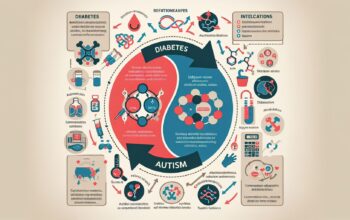Given the complexities of the human body, it’s not surprising that one condition can potentially impact the presence and severity of another. For both health professionals and researchers, understanding these connections is critical for improving treatment and prevention strategies. One particularly noteworthy link is that between diabetes and autism. Although it may seem odd to connect a metabolic disease like diabetes with a neurodevelopmental disorder like autism, recent studies suggest a compelling correlation.
Unraveling the Link Between Diabetes and Autism
Scientists have always been keen to understand the factors contributing to autism. According to research published in JAMA in 2018, maternal diabetes (both pre-existing type 2 and gestational onset diabetes) increases the risk of autism spectrum disorders (ASDs) in children. The risk was even higher in cases where mothers suffered from type 2 diabetes prior to pregnancy.
While the data does not point directly to a cause-effect relationship, understanding the correlation is crucial. Interestingly, the prevalence rates for both autism and diabetes have been trending upward over the past few decades. The Centers for Disease Control and Prevention (CDC) reports that 1 in 59 children in the USA are diagnosed with ASD, a significant increase from the 1 in 150 rate reported in 2000. Meanwhile, diabetes is affecting around 10.5% of the American population, with an estimated 1.5 million new cases recorded annually.
The Health Implications of the Diabetes-Autism Link
Understanding this link has significant implications for both autism and diabetes prevention strategies. If you’re a prospective parent with diabetes, you need to be aware that managing your blood sugar level is not only important for your health but may also be critical for the wellbeing of your unborn child. Keeping diabetes under control will not only benefit your own health but could possibly play a part in reducing the risk of autism in your child.
Moreover, it’s worth being aware that the diagnosis of one of these conditions could potentially lead to the other. For example, a 2015 review in Current Diabetes Reports found that people with autism are more likely to develop type 2 diabetes and other metabolic syndromes. While more research is needed to explore this link, it’s enough to suggest that maintaining a healthy lifestyle is important—not just for your own wellbeing but potentially for your children’s too.
Theories Behind the Connection
Scientists are still trying to unravel the relationship between diabetes and autism. One theory stems from the idea that diabetes is an inflammatory condition. During pregnancy, high blood sugar levels can lead to inflammation in the placenta, impacting the development of the fetal brain, making it more susceptible to autism.
Another theory has to do with the insulin-like growth factor (IGF), a hormone that plays a crucial part in prenatal and postnatal growth. Research in the Journal of Endocrinological Investigation implies that there’s a disparity in the circulation of IGF among children with autism, theoretically leading to a potential development of ASD symptoms. Since diabetes also disturbs the regulation of IGF, the connection between the two disorders becomes more feasible.
Steps for Prevention and Control
Thankfully, the awareness of this diabetes-autism link provides more opportunities for prevention and control. For those with diabetes, managing the condition becomes even more crucial. You should work with healthcare professionals to develop a lifestyle management plan tailored to your unique needs. Regular monitoring of blood sugar levels, adopting a balanced diet, physical activity, medication, and stress management are all critical elements of a diabetes management plan.
However, it is also important to recognize that although there may be a link between diabetes and autism, having diabetes does not guarantee an autism diagnosis for your child. It’s just one of the many risk factors researchers are studying. If you have concerns about autism, consult with healthcare professionals who can provide you with accurate information and helpful resources.
Moving Forward
While there’s still much to learn about the link between diabetes and autism, the connection between the two provides important insights for the prevention and management of both disorders. Realizing this association is a step towards a more comprehensive approach in managing and understanding these conditions. It’s important to stay informed and proactive in controlling diabetes and understanding its potential ripple effects.
Understanding how diseases affect one another can greatly advance our healthcare strategies. As research continues, it serves as a reminder that the human body is an integrated system where our physical health can significantly impact our neurological health.




